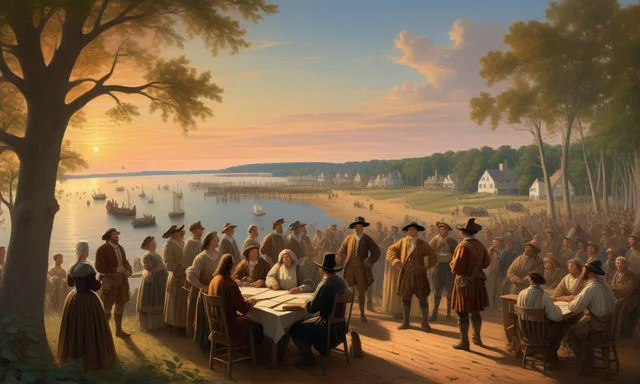The Birth of a Colony
In the early 17th century, as European powers expanded their reach across the Atlantic, the foundation of new colonies in the Americas was driven by a variety of motives, including economic opportunities, political aspirations, and religious freedom. Among these colonies, Maryland stands out as a unique experiment in religious tolerance during a time of widespread religious conflict in Europe.
The Vision of George Calvert
The story of Maryland begins with George Calvert, the first Lord Baltimore. A prominent English statesman who converted to Catholicism, Calvert faced increasing difficulties due to his faith in predominantly Protestant England. Seeking a refuge for Catholics who were persecuted under English laws, he petitioned King Charles I for a charter to establish a new colony. In 1632, the king granted Calvert a charter for the land north of the Potomac River, which would become Maryland, named in honor of Queen Henrietta Maria.

A Haven for Religious Freedom
Maryland was unique from its inception due to its explicit commitment to religious tolerance. The charter granted to Calvert included unprecedented powers for self-governance and the authority to create laws, provided they were not inconsistent with the laws of England. Most importantly, it allowed for the free practice of religion, a radical departure from the religious uniformity enforced in other colonies.
The Maryland Toleration Act of 1649
The promise of religious freedom was formalized in 1649 with the passage of the Maryland Toleration Act, also known as the Act Concerning Religion. This landmark legislation guaranteed freedom of worship for all Christians, regardless of their denomination. While it did not extend this freedom to non-Christians, it was a significant step toward religious pluralism and set a precedent for future legal protections for religious minorities.
Challenges to Tolerance
Despite its progressive laws, Maryland‘s commitment to religious tolerance was tested numerous times. The colony experienced periods of conflict, especially during the English Civil War, when Protestant settlers challenged the authority of the Catholic proprietors. However, the foundational principles of the colony ensured that religious tolerance remained a core value, even as the political landscape shifted.
Legacy of Religious Tolerance
Maryland‘s experiment with religious tolerance had a lasting impact on the development of religious freedom in America. It served as a model for the inclusion of religious liberty in the United States Constitution over a century later. The principles established in Maryland influenced the Founding Fathers as they crafted the First Amendment, ensuring that freedom of religion became a fundamental right in the new nation.
Conclusion
The founding of Maryland and its role in promoting religious tolerance represent a critical chapter in the history of religious freedom. George Calvert’s vision of a safe haven for persecuted Catholics and the subsequent Maryland Toleration Act of 1649 laid the groundwork for a more inclusive society. Maryland‘s legacy reminds us of the enduring importance of protecting religious liberty for all, a principle that continues to shape the United States today.
FAQs
What was the religious tolerance in Maryland?
Maryland, founded by Catholics, enacted the 1649 Maryland Toleration Act, granting religious freedom to Christians, but tensions persisted, leading to eventual Protestant dominance and reduced Catholic freedoms.
What role did religion play in the founding and development of Maryland?
Religion played a central role in Maryland’s founding, as it was established as a haven for English Catholics by Lord Baltimore, promoting religious tolerance through the Act of Toleration in 1649.
How did Maryland contribute to religious freedom?
Maryland contributed to religious freedom through the Maryland Toleration Act of 1649, which granted religious tolerance for Trinitarian Christians, marking one of the first laws protecting religious freedom in America.
Source : chatgpt.com
